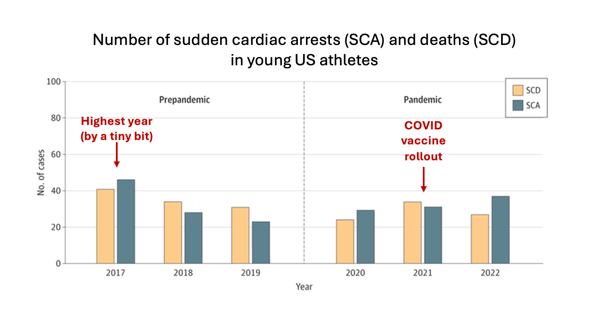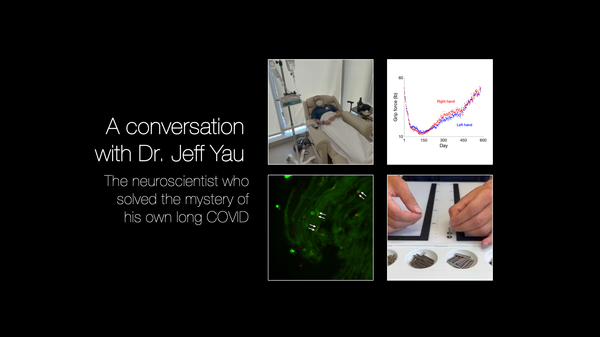Will the COVID vaccine sterilize women?
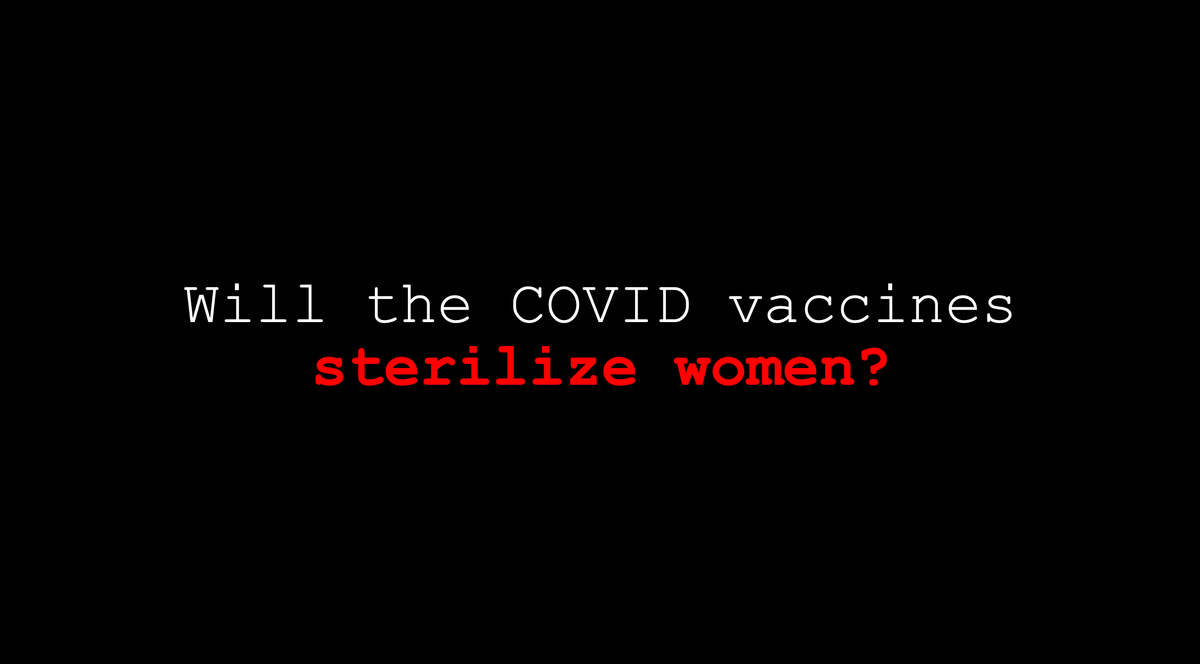
Yesterday someone sent me an article about an alleged side effect of the COVID vaccine: female sterilization. The argument goes like this: there is a protein expressed in the placenta (syncytin-1) that is similar to the coronavirus spike protein encoded by the vaccines. Because these proteins are allegedly so similar, an antibody response generated against the vaccine will allegedly attack this protein in the placenta as well, causing sterilization.
So, should we be worried that the COVID vaccine will sterilize women?
Absolutely not. Here’s why.
The entire claim hinges on the assertion that the COVID spike protein and syncitin-1 (the placenta protein) are similar. One word we use for protein similarity is homology. Think of homology like genetic plagiarism. In plagiarism, if two journal articles have a common source (one was copied from the other), we would expect to see a high degree of similarity between the words and sentences in the two articles (or at least between some subset of the paragraphs.) Having a few words or phrases in common is not enough to suggest plagiarism… short phrases are bound to be repeated in totally unrelated pieces of writing. We would need to see long phrases and perhaps full sentences to suspect something was amiss.
The same concept applies to proteins: when two proteins are homologous, they share a high degree of similarity in their amino acid sequence. (As a quick refresher, proteins are chains of amino acids that fold up in just the right way to do helpful stuff in your cells). If two proteins have only a few short strings of amino acids in common, this is not enough to suggest homology. We’d need long sections of matching amino acid sequences to suspect that the two proteins may be very similar (highly homologous).
Ultimately what we care about, in the context of an aberrant antibody response against the placenta, is the shape of the proteins. If two proteins are extremely similar in shape, an antibody might mistake one for the other and accidentally attack the wrong thing. As the shape of a protein is ultimately determined by its amino acid sequence, in order for us to suspect that an antibody targeting the coronavirus spike protein will accidentally attack syncytin-1 instead, there would need to be a high degree of similarity between the amino acid sequences of these two proteins.
So, is there? Here is a sequence alignment of the two proteins. This is created by a program that attempts to detect homology, and will try to line up regions of the amino acid sequences that match. Each letter represents a specific amino acid, and the stars indicate “matches.” But remember that the amino acid alphabet is only 20 letters long, so there are bound to be some matches at random. This is what we see for these two proteins:
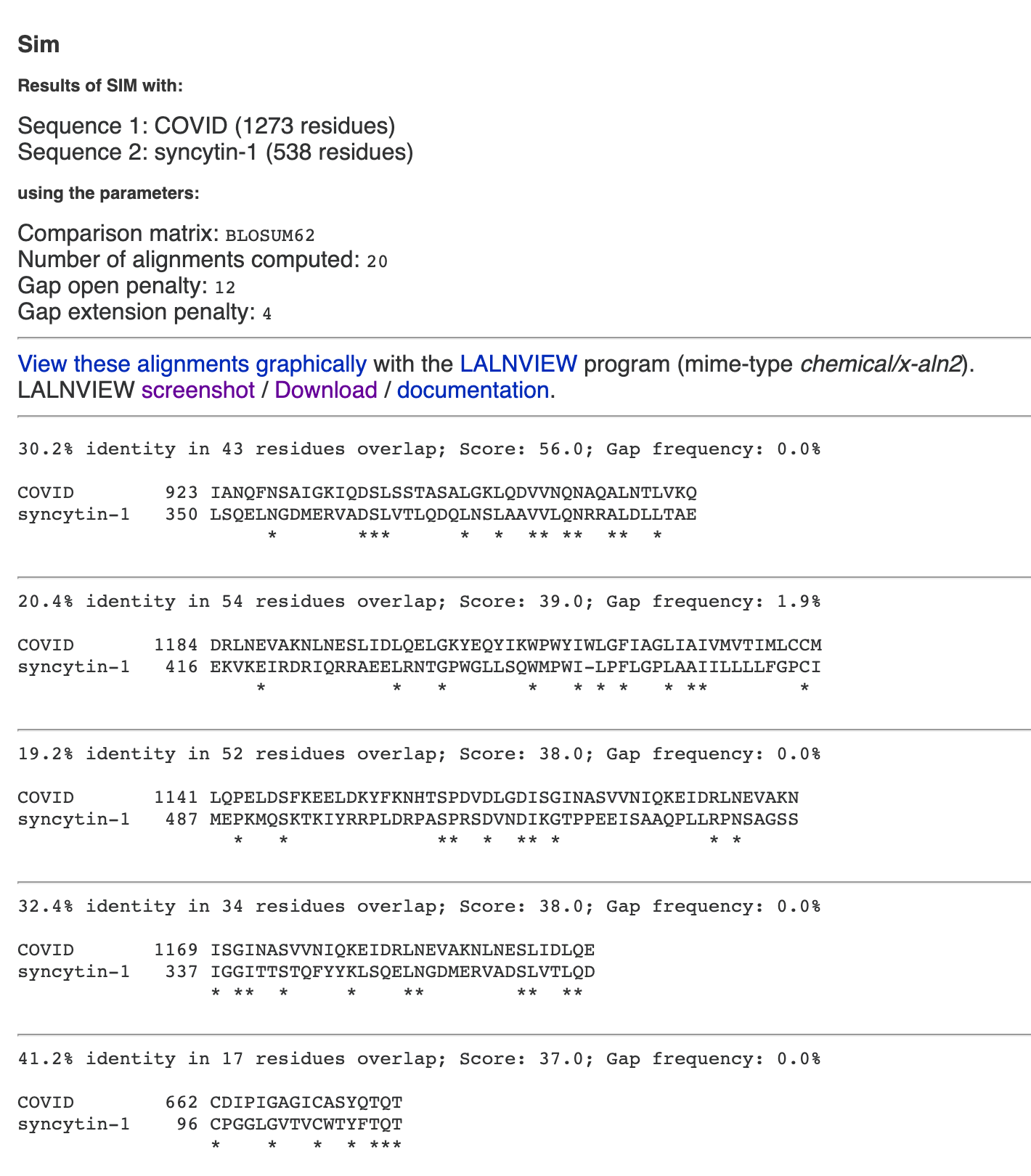
So is this enough “matching” to make us concerned? While back in February, one scientist looked at this and speculated there may be some similarity (which is probably what started this whole rumor), many argue it’s absolutely not. Why? Very simply, it’s because we need a very high degree of similarity to cause a problem. Because proteins are long and only have 20 letters in their alphabet, you can run these analyses for random proteins and find small regions that “match”, just by chance.
Don’t believe me? Well let’s pick another random protein and do the same thing. For this, to try to make it truly random, I typed “the best gene” into the NCBI genome browser and took the first human gene result, bestrophin-1. Then I performed the same type of alignment. The results are below.
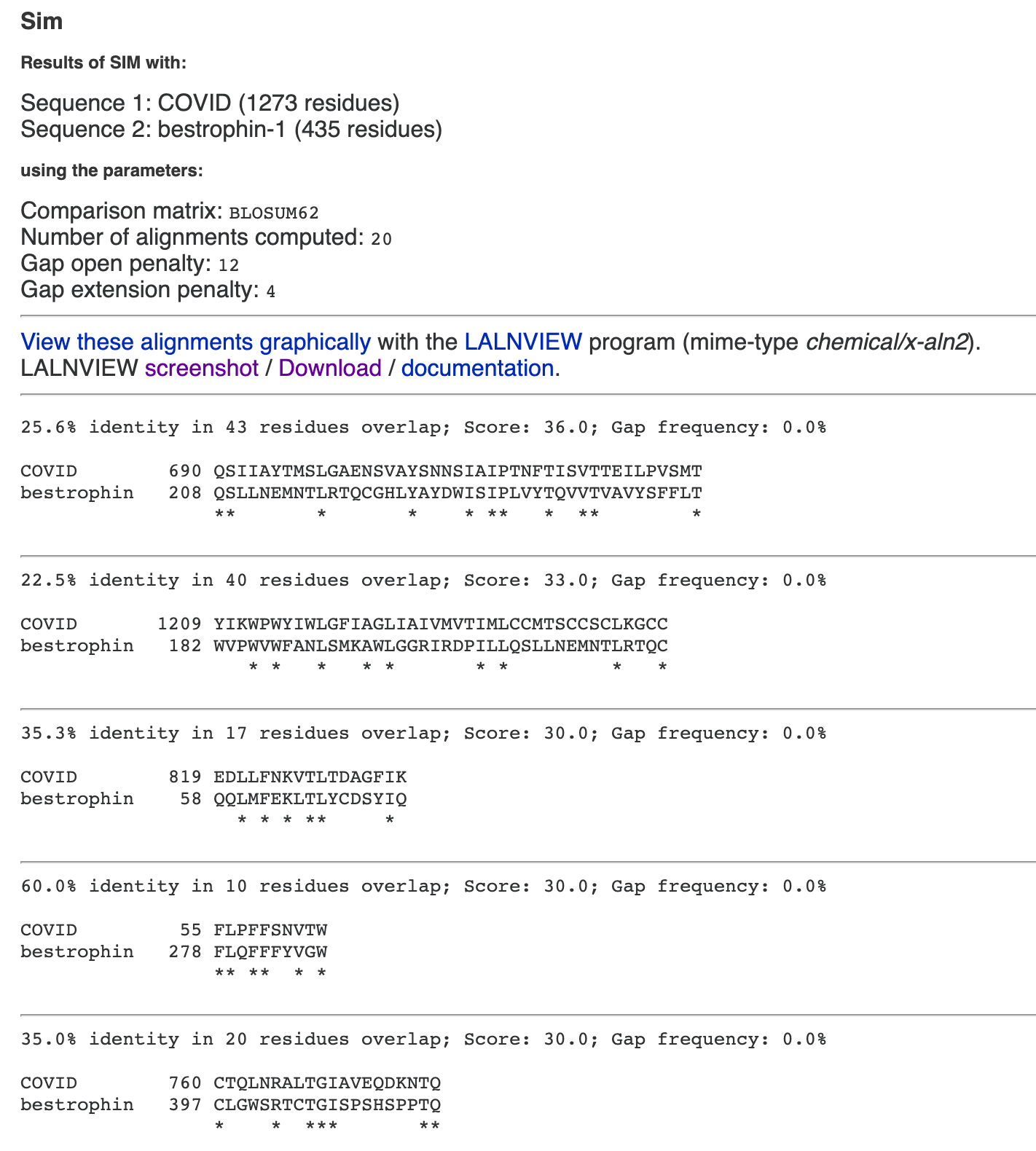
Again, we see random matches. If you want to see this tested with even more proteins, check out this post (also links to some more resources going into more detail on this topic.) Also check out this post for a far more detailed explanation of this topic. Now, is it theoretically possible for two proteins with a low degree of homology to fold up in just the right way to cause antibody cross-reactivity? Yes it is, but this is very rare. And because of the prevalence of random matching, we would need more evidence than just a low degree of sequence homology to make us seriously concerned that there was a problem. If I had gone into my PhD qualifying exam with such minimal evidence to support my hypothesis, I probably would have failed.
But let’s suppose for a second that this hypothesis was correct, and there was cross-reactivity between the COVID spike protein and this placenta protein. Do you know what else causes humans to form antibodies against the COVID spike protein, besides the COVID vaccines? COVID. If this hypothesis were true, we would have this exact same concern about people who had COVID infections. This was the primary concern of the scientist who posted about this back in February, not the vaccine. But this only became news when other people (not that scientist) made a huge issue about the vaccine, but didn’t mention anything about COVID. Why go around telling people they’ll get sterilized if they take the vaccine, but forget to mention that, if they’re right and there really is antibody cross-reactivity against the placenta, COVID would do the exact same thing? Also, for the record, this would be a fairly easy hypothesis to test in vitro in a laboratory. If someone was really concerned about this, the responsible thing would have been to run the quick experiments testing for cross-reactivity, not jump to conclusions and declare to the entire world that the vaccine will make people sterile (and forget to mention that COVID infection would allegedly do the same thing). Edit: A lab has now run this experiment, and found no cross-reactivity between the placenta protein and COVID antibodies.
But knowing that COVID infections would do the exact same thing gives us one other way to check this hypothesis about antibody cross-reactivity: if antibodies to the COVID spike protein attacked the placenta, we would expect to see higher rates of adverse pregnancy outcomes in pregnant women who got COVID. So, are women who get COVID more likely to lose their pregnancies? While this topic is still under investigation, there is not clear evidence to suggest that COVID increases the risk of fetal demise. Here is one recent study that showed no difference in adverse pregnancy outcomes between patients who had COVID during pregnancy versus those who didn’t. While we should certainly study the impact of COVID on pregnancy further, I think we can confidently say that COVID isn’t sterilizing everyone.
In conclusion, the entire claim about the risk of sterilization with COVID vaccination hinges on minimal evidence of homology between the COVID spike protein and syncytin-1, and forgets to mention that if this risk were real, it would happen with COVID infections as well. Given the minimal similarity between these proteins, the lack of any other laboratory evidence to suggest there may be cross-reactivity, and the observation that many pregnant women have gotten COVID without losing their pregnancies, this rumor does not concern me at all.


